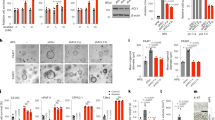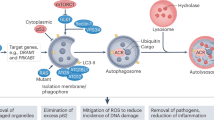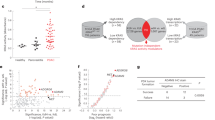Abstract
Pancreatic cancer (PC) and associated pre-neoplastic lesions have been reported to be hypoxic, primarily due to hypovascular nature of PC. Though the presence of hypoxia under cancerous condition has been associated with the overexpression of oncogenic proteins (MUC1), multiple emerging reports have also indicated the growth inhibitory effects of hypoxia. In spite of being recognized as the top-most differentially expressed and established oncogenic protein in PC, MUC4 regulation in terms of micro-environmental stress has not been determined. Herein, for the first time, we are reporting that MUC4 protein stability is drastically affected in PC, under hypoxic condition in a hypoxia inducible factor 1α (HIF-1α)-independent manner. Mechanistically, we have demonstrated that hypoxia-mediated induction of reactive oxygen species (ROS) promotes autophagy by inhibiting pAkt/mTORC1 pathway, one of the central regulators of autophagy. Immunohistofluorescence analyses revealed significant negative correlation (P-value=0.017) between 8-hydroxy guanosine (8-OHG) and MUC4 in primary pancreatic tumors (n=25). Moreover, we found pronounced colocalization between MUC4 and LAMP1/LC3 (microtubule-associated protein 1A/1B-light chain 3) in PC tissues and also observed their negative relationship in their expression pattern, suggesting that areas with high autophagy rate had less MUC4 expression. We also found that hypoxia and ROS have negative impact on overall cell growth and viability, which was partially, though significantly (P<0.05), rescued in the presence of MUC4. Altogether, hypoxia-mediated oxidative stress induces autophagy in PC, leading to the MUC4 degradation to enhance survival, possibly by offering required metabolites to stressed cells.
This is a preview of subscription content, access via your institution
Access options
Subscribe to this journal
Receive 50 print issues and online access
$259.00 per year
only $5.18 per issue
Buy this article
- Purchase on Springer Link
- Instant access to full article PDF
Prices may be subject to local taxes which are calculated during checkout







Similar content being viewed by others
Abbreviations
- 8-OHG:
-
8-hydroxyguanosine
- CHX:
-
cycloheximide
- CoCl2:
-
cobalt chloride
- DCFDA:
-
dihydrodichlorofluorescein diacetate
- DMEM:
-
Dulbecco’s modified Eagle’s medium
- H2O2:
-
hydrogen peroxide
- HIF-1α:
-
hypoxia inducible factor-1 alpha
- kd:
-
knocked down
- LC3:
-
microtubule-associated protein 1A/1B-light chain 3
- MDC:
-
monodansylcadaverine
- MFI:
-
mean fluorescence intensity
- MG132:
-
carbobenzoxy-l-leucyl-l-leucyl-l-leucinal
- MTT:
-
3-[4,5-dimethylthiozol-2-yl]-2,5diphenyltetrazoliumbromide
- NAC:
-
N-acetyl-cysteine
- ns:
-
non-significant
- qRT–PCR:
-
quantitative real-time PCR
- RAP:
-
rapamycin
- ROS:
-
reactive oxygen species
- VB:
-
vinblastine
- VNTR:
-
variable number of tandem repeats
- WB:
-
western blot
- α-TS:
-
alpha-tocopherol succinate.
References
Siegel R, Ma J, Zou Z, Jemal A . Cancer statistics, 2014. CA Cancer J Clin 2014; 64: 9–29.
Sullivan R, Pare GC, Frederiksen LJ, Semenza GL, Graham CH . Hypoxia-induced resistance to anticancer drugs is associated with decreased senescence and requires hypoxia-inducible factor-1 activity. Mol Cancer Ther 2008; 7: 1961–1973.
Kaur S, Kumar S, Momi N, Sasson AR, Batra SK . Mucins in pancreatic cancer and its microenvironment. Nat Rev Gastroenterol Hepatol 2013; 10: 607–620.
Graeber TG, Osmanian C, Jacks T, Housman DE, Koch CJ, Lowe SW et al. Hypoxia-mediated selection of cells with diminished apoptotic potential in solid tumours. Nature 1996; 379: 88–91.
Andrianifahanana M, Moniaux N, Schmied BM, Ringel J, Friess H, Hollingsworth MA et al. Mucin (MUC) gene expression in human pancreatic adenocarcinoma and chronic pancreatitis: a potential role of MUC4 as a tumor marker of diagnostic significance. Clin Cancer Res 2001; 7: 4033–4040.
Hinoda Y, Ikematsu Y, Horinochi M, Sato S, Yamamoto K, Nakano T et al. Increased expression of MUC1 in advanced pancreatic cancer. J Gastroenterol 2003; 38: 1162–1166.
Rachagani S, Torres MP, Kumar S, Haridas D, Baine M, Macha MA et al. Mucin (Muc) expression during pancreatic cancer progression in spontaneous mouse model: potential implications for diagnosis and therapy. J Hematol Oncol 2012; 5: 68.
Joshi S, Kumar S, Bafna S, Rachagani S, Wagner KU, Jain M et al. Genetically engineered mucin mouse models for inflammation and cancer. Cancer Metastasis Rev 2015; 34: 593–609.
Aubert S, Fauquette V, Hemon B, Lepoivre R, Briez N, Bernard D et al. MUC1, a new hypoxia inducible factor target gene, is an actor in clear renal cell carcinoma tumor progression. Cancer Res 2009; 69: 5707–5715.
Chaika NV, Gebregiworgis T, Lewallen ME, Purohit V, Radhakrishnan P, Liu X et al. MUC1 mucin stabilizes and activates hypoxia-inducible factor 1 alpha to regulate metabolism in pancreatic cancer. Proc Natl Acad Sci USA 2012; 109: 13787–13792.
Kitamoto S, Yokoyama S, Higashi M, Yamada N, Takao S, Yonezawa S . MUC1 enhances hypoxia-driven angiogenesis through the regulation of multiple proangiogenic factors. Oncogene 2013; 32: 4614–4621.
Joshi S, Kumar S, Choudhury A, Ponnusamy MP, Batra SK . Altered mucins (MUC) trafficking in benign and malignant conditions. Oncotarget 2014; 5: 7272–7284.
Senapati S, Chaturvedi P, Chaney WG, Chakraborty S, Gnanapragassam VS, Sasson AR et al. Novel INTeraction of MUC4 and galectin: potential pathobiological implications for metastasis in lethal pancreatic cancer. Clin Cancer Res 2011; 17: 267–274.
Singh AP, Moniaux N, Chauhan SC, Meza JL, Batra SK . Inhibition of MUC4 expression suppresses pancreatic tumor cell growth and metastasis. Cancer Res 2004; 64: 622–630.
Mimeault M, Johansson SL, Senapati S, Momi N, Chakraborty S, Batra SK . MUC4 down-regulation reverses chemoresistance of pancreatic cancer stem/progenitor cells and their progenies. Cancer Lett 2010; 295: 69–84.
Kumar S, Das S, Rachagani S, Kaur S, Joshi S, Johansson SL et al. NCOA3-mediated upregulation of mucin expression via transcriptional and post-translational changes during the development of pancreatic cancer. Oncogene 2015; 34: 4879–4889.
Kitamoto S, Yokoyama S, Higashi M, Yamada N, Matsubara S, Takao S et al. Expression of MUC17 is regulated by HIF1alpha-mediated hypoxic responses and requires a methylation-free hypoxia responsible element in pancreatic cancer. PLoS One 2012; 7: e44108.
Kim YJ, Cho HJ, Shin WC, Song HA, Yoon JH, Kim CH . Hypoxia-mediated mechanism of MUC5AC production in human nasal epithelia and its implication in rhinosinusitis. PLoS One 2014; 9: e98136.
Ding WX, Ni HM, Gao W, Yoshimori T, Stolz DB, Ron D et al. Linking of autophagy to ubiquitin-proteasome system is important for the regulation of endoplasmic reticulum stress and cell viability. Am J Pathol 2007; 171: 513–524.
Ge PF, Zhang JZ, Wang XF, Meng FK, Li WC, Luan YX et al. Inhibition of autophagy induced by proteasome inhibition increases cell death in human SHG-44 glioma cells. Acta Pharmacol Sin 2009; 30: 1046–1052.
Liu C, Yan X, Wang HQ, Gao YY, Liu J, Hu Z et al. Autophagy-independent enhancing effects of Beclin 1 on cytotoxicity of ovarian cancer cells mediated by proteasome inhibitors. BMC Cancer 2012; 12: 622.
Vaupel P, Mayer A . Hypoxia in cancer: significance and impact on clinical outcome. Cancer Metastasis Rev 2007; 26: 225–239.
Shao MX, Nadel JA . Neutrophil elastase induces MUC5AC mucin production in human airway epithelial cells via a cascade involving protein kinase C, reactive oxygen species, and TNF-alpha-converting enzyme. J Immunol 2005; 175: 4009–4016.
Liu Z, Lenardo MJ . Reactive oxygen species regulate autophagy through redox-sensitive proteases. Dev Cell 2007; 12: 484–485.
Yang S, Wang X, Contino G, Liesa M, Sahin E, Ying H et al. Pancreatic cancers require autophagy for tumor growth. Genes Dev 2011; 25: 717–729.
Munafo DB, Colombo MI . A novel assay to study autophagy: regulation of autophagosome vacuole size by amino acid deprivation. J Cell Sci 2001; 114: 3619–3629.
Zhou J, Tan SH, Nicolas V, Bauvy C, Yang ND, Zhang J et al. Activation of lysosomal function in the course of autophagy via mTORC1 suppression and autophagosome-lysosome fusion. Cell Res 2013; 23: 508–523.
Wang RC, Wei Y, An Z, Zou Z, Xiao G, Bhagat G et al. Akt-mediated regulation of autophagy and tumorigenesis through Beclin 1 phosphorylation. Science 2012; 338: 956–959.
Endo H, Okuyama H, Ohue M, Inoue M . Dormancy of cancer cells with suppression of AKT activity contributes to survival in chronic hypoxia. PLoS One 2014; 9: e98858.
Blanco FF, Jimbo M, Wulfkuhle J, Gallagher I, Deng J, Enyenihi L et al. The mRNA-binding protein HuR promotes hypoxia-induced chemoresistance through posttranscriptional regulation of the proto-oncogene PIM1 in pancreatic cancer cells. Oncogene 2015, ; e-pub ahead of print 21 September 2015; doi:10.1038/onc.2015.325.
Moniaux N, Chaturvedi P, Varshney GC, Meza JL, Rodriguez-Sierra JF, Aubert JP et al. Human MUC4 mucin induces ultra-structural changes and tumorigenicity in pancreatic cancer cells. Br J Cancer 2007; 97: 345–357.
Yu L, McPhee CK, Zheng L, Mardones GA, Rong Y, Peng J et al. Termination of autophagy and reformation of lysosomes regulated by mTOR. Nature 2010; 465: 942–946.
Zhang X, Wu RS, Fu W, Xu L, Lam PK . Production of reactive oxygen species and 8-hydroxy-2'deoxyguanosine in KB cells co-exposed to benzo[a]pyrene and UV-A radiation. Chemosphere 2004; 55: 1303–1308.
Kasai H . Chemistry-based studies on oxidative DNA damage: formation, repair, and mutagenesis. Free Radic Biol Med 2002; 33: 450–456.
Papandreou I, Krishna C, Kaper F, Cai D, Giaccia AJ, Denko NC . Anoxia is necessary for tumor cell toxicity caused by a low-oxygen environment. Cancer Res 2005; 65: 3171–3178.
Vasseur S, Tomasini R, Tournaire R, Iovanna JL . Hypoxia induced tumor metabolic switch contributes to pancreatic cancer aggressiveness. Cancers (Basel) 2010; 2: 2138–2152.
Chaturvedi P, Singh AP, Chakraborty S, Chauhan SC, Bafna S, Meza JL et al. MUC4 mucin interacts with and stabilizes the HER2 oncoprotein in human pancreatic cancer cells. Cancer Res 2008; 68: 2065–2070.
Zhi X, Tao J, Xie K, Zhu Y, Li Z, Tang J et al. MUC4-induced nuclear translocation of beta-catenin: a novel mechanism for growth, metastasis and angiogenesis in pancreatic cancer. Cancer Lett 2014; 346: 104–113.
Sendoel A, Hengartner MO . Apoptotic cell death under hypoxia. Physiology (Bethesda) 2014; 29: 168–176.
Filomeni G, De ZD, Cecconi F . Oxidative stress and autophagy: the clash between damage and metabolic needs. Cell Death Differ 2015; 22: 377–388.
Hashimoto D, Blauer M, Hirota M, Ikonen NH, Sand J, Laukkarinen J . Autophagy is needed for the growth of pancreatic adenocarcinoma and has a cytoprotective effect against anticancer drugs. Eur J Cancer 2014; 50: 1382–1390.
Commisso C, Davidson SM, Soydaner-Azeloglu RG, Parker SJ, Kamphorst JJ, Hackett S et al. Macropinocytosis of protein is an amino acid supply route in Ras-transformed cells. Nature 2013; 497: 633–637.
Kamphorst JJ, Nofal M, Commisso C, Hackett SR, Lu W, Grabocka E et al. Human pancreatic cancer tumors are nutrient poor and tumor cells actively scavenge extracellular protein. Cancer Res 2015; 75: 544–553.
Siddiqui A, Heinzerling J, Livingston EH, Huerta S . Predictors of early mortality in veteran patients with pancreatic cancer. Am J Surg 2007; 194: 362–366.
Gupta D, Lis CG . Pretreatment serum albumin as a predictor of cancer survival: a systematic review of the epidemiological literature. Nutr J 2010; 9: 69.
Sayin VI, Ibrahim MX, Larsson E, Nilsson JA, Lindahl P, Bergo MO . Antioxidants accelerate lung cancer progression in mice. Sci Transl Med 2014; 6: 221ra15.
Chandel NS, Tuveson DA . The promise and perils of antioxidants for cancer patients. N Engl J Med 2014; 371: 177–178.
Greco E, Basso D, Fadi E, Padoan A, Fogar P, Zambon CF et al. Analogs of vitamin E epitomized by alpha-tocopheryl succinate for pancreatic cancer treatment: in vitro results induce caution for in vivo applications. Pancreas 2010; 39: 662–668.
Dhillon H, Chikara S, Reindl KM . Piperlongumine induces pancreatic cancer cell death by enhancing reactive oxygen species and DNA damage. Toxicol Rep 2014; 1: 309–318.
Seshacharyulu P, Ponnusamy MP, Rachagani S, Lakshmanan I, Haridas D, Yan Y et al. Targeting EGF-receptor(s) - STAT1 axis attenuates tumor growth and metastasis through downregulation of MUC4 mucin in human pancreatic cancer. Oncotarget 2015; 6: 5164–5181.
Rachagani S, Macha MA, Ponnusamy MP, Haridas D, Kaur S, Jain M et al. MUC4 potentiates invasion and metastasis of pancreatic cancer cells through stabilization of fibroblast growth factor receptor 1. Carcinogenesis 2012; 33: 1953–1964.
Biederbick A, Kern HF, Elsasser HP . Monodansylcadaverine (MDC) is a specific in vivo marker for autophagic vacuoles. Eur J Cell Biol 1995; 66: 3–14.
Acknowledgements
We thank Dr Jerred Garrison, Dr Pankaj K Singh and Dr Michael Hollingsworth for providing us hypoxia chamber, HIF-1α Sh RNA constructs and human MUC1 antibody, respectively. We would also like to thank Kavita Mallya, James Talaska, Janice Taylor, Dr Nilesh Wagh and Dr Phillip Hexley for technical support. Finally, we would like to thank RAPID autopsy program and related personnel and UNMC graduate studies fellowship. The work was supported, in parts, by grants from the NIH (UO1 CA111294, P50 CA127297, U54 CA163120 and RO1 CA183459).
Author information
Authors and Affiliations
Corresponding authors
Ethics declarations
Competing interests
The authors declare no conflict of interest.
Additional information
Supplementary Information accompanies this paper on the Oncogene website
Rights and permissions
About this article
Cite this article
Joshi, S., Kumar, S., Ponnusamy, M. et al. Hypoxia-induced oxidative stress promotes MUC4 degradation via autophagy to enhance pancreatic cancer cells survival. Oncogene 35, 5882–5892 (2016). https://doi.org/10.1038/onc.2016.119
Received:
Revised:
Accepted:
Published:
Issue Date:
DOI: https://doi.org/10.1038/onc.2016.119
This article is cited by
-
Targeting hypoxic tumor microenvironment in pancreatic cancer
Journal of Hematology & Oncology (2021)
-
Novel oncogene COPS3 interacts with Beclin1 and Raf-1 to regulate metastasis of osteosarcoma through autophagy
Journal of Experimental & Clinical Cancer Research (2018)
-
Nanomaterial-assisted sensitization of oncotherapy
Nano Research (2018)



